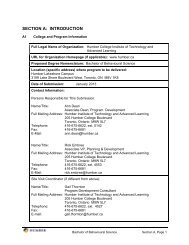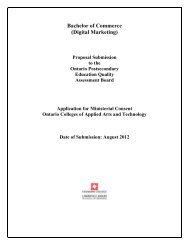Master of Business Administration (Financial Services)
Master of Business Administration (Financial Services)
Master of Business Administration (Financial Services)
- No tags were found...
Create successful ePaper yourself
Turn your PDF publications into a flip-book with our unique Google optimized e-Paper software.
Assessment Report <strong>of</strong> Dalhousie University’s Quality Assurance Policies and Procedures 7The Monitoring Committee strongly suggests that Dalhousie develop an overarching policy that describesthe relationships among the different types <strong>of</strong> reviews (Senate-led, faculty-led, Faculty <strong>of</strong> Graduate Studiesledand Accreditation) and the ways in which each contributes to quality improvement within the University.An overarching policy with clearly defined links between reviews would enable the University to moreeffectively leverage and use the information from one review to complement another, thus minimizingduplication. In addition, this policy should identify common elements to be included in each review t<strong>of</strong>acilitate a comparison <strong>of</strong> units.The Monitoring Committee also suggests that an annual report, which highlights the review process,outcomes and follow-up action, be submitted to Senate as one way to strengthen the link and the lines <strong>of</strong>accountability between reviews done by faculties and reviews done by Senate.4.2.2 Balance the policy to make it more student-centredAs noted above, the Monitoring Committee believes that the Guidelines for Unit Reviews are more focussedon collecting data to provide information for academic planning and subsequent budgetary activities withinthe faculties, which, while forming a basis for the improvement <strong>of</strong> academic <strong>of</strong>ferings, are not clearly relatedto the delivery <strong>of</strong> <strong>of</strong>ferings and the student learning experience. Given that these guidelines are the templatefaculties must use to develop their respective quality assurance policies, it is not surprising that somefaculties have developed review policies that are more focussed on the allocation <strong>of</strong> resources than on thestudent experience. The Committee did note, however, that the Faculty <strong>of</strong> Graduate Studies and the Faculty<strong>of</strong> Health Pr<strong>of</strong>essions have developed review policies that meet the requirements set out by the guidelines,that are student-centred and that are designed to collect a number <strong>of</strong> measures to inform decisions relatedto the improvement <strong>of</strong> academic <strong>of</strong>ferings.The Terms <strong>of</strong> Reference for a committee reviewing a faculty under the auspices <strong>of</strong> Senate are focussed onmeasures related to faculty performance, organizational structure, and relationship with other units andprogrammes within and outside <strong>of</strong> Dalhousie and as a result are more in line with the objective, the provision<strong>of</strong> information for academic planning and subsequent budgetary activities, and are more focussed on humanresources than on the student experience. Subsequently, and as noted in Dalhousie’s self-study and indiscussions during the site visit, the results <strong>of</strong> the reviews <strong>of</strong> faculties have been used primarily to inform, forexample, the reappointment or selection <strong>of</strong> deans, faculty selection (such as fields within a discipline requiringadditional faculty), physical plant planning, new programme development, and academic entrepreneurship.Many faculties seem to have equated the review process with resource allocation and specifically theallocation <strong>of</strong> faculty positions. While the Committee noted examples <strong>of</strong> reviews <strong>of</strong> faculties done under theauspices <strong>of</strong> Senate that clearly focussed on the student learning experience such as with the Faculty <strong>of</strong>Computer Science and the Faculty <strong>of</strong> Architecture and Planning, this was less evident in Senate-led reviews<strong>of</strong> faculties with multiple departments.Student evaluations <strong>of</strong> teaching, conducted on a class by class basis, are used extensively by Dalhousie toinform departmental decision-making and recommendations concerning tenure and promotion. TheMonitoring Committee believes that Dalhousie should also consider incorporating the aggregate results <strong>of</strong>student evaluations into its quality assurance programme as well as integrating measures <strong>of</strong> academic qualitysuch as teaching and learning, and curriculum into its guidelines.Ideally, a quality assurance policy should focus on both research and scholarship and the student experience.While Dalhousie’s Guidelines and Terms <strong>of</strong> Reference for Senate led reviews do focus on the former, the101
















